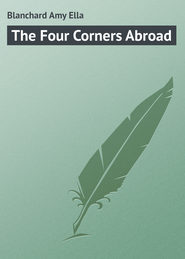По всем вопросам обращайтесь на: info@litportal.ru
(©) 2003-2024.
✖
The Four Corners
Настройки чтения
Размер шрифта
Высота строк
Поля
"I'll find out the why and wherefore," replied Aunt Sarah, shaking her head warningly. "How did you get along, Nan? I suppose with Mitty and Unc' Landy you have had no trouble."
"We had an awful time," Nan answered. "Mitty took an afternoon and evening off. Mother promised her long ago that she should go to the festival of the Sons and Daughters of Moses and Aaron and we had a terrible thunder-storm that scared us nearly to death and that kept Unc' Landy from getting back from the mill where he had gone for some feed. Then the boys came and it was pitch dark before I could get supper ready."
"Yes, and Jack fell down and mashed the cake so some of it was crite flat," put in Jean.
"I don't care; it was dreadfully slippery coming up the hill and, anyhow, it tasted good. Randolph ate two pieces," protested Jack.
"So did you," retorted Jean.
"Hush, hush your squabbling, children," said Aunt Sarah. "Well, Nan, you did have your hands full. I'd have been more put out than I was if I had known those boys were here. I suppose, though, you didn't make any difference for them, just two youngsters like them."
"Indeed we did make a difference," Jack told her proudly. "We had out all the best china and silver, and Nan made biscuits, and we borrowed cake from Cousin Mag, and all that."
"For pity's sake, what did you make all that fuss for over two young cubs of boys?"
"We wanted to give them a good impression," said Nan, with dignity. "Mother says so much depends upon the first impression."
Aunt Sarah laughed. "Well, you might have saved yourselves in my opinion. What are the lads like? Nice fellows?"
"I suppose so," returned Nan doubtfully. "They haven't given us much of a chance to find out. Randolph says very little and Ashby nothing at all except: 'Please pass the bread' or 'Please pass the butter.'"
"Those remarks don't furnish much of a clue to character," remarked Aunt Sarah with a little smile. "Probably they are bashful and are not used to girls. Here in a houseful of them with no older person they feel mighty queer, I have no doubt. Their tongues will loosen up after a few days. You put them in your room? Your mother wrote that you wanted to."
"Yes, and we made it look pretty well. There is a broken chair that Unc' Landy is going to mend, and some of our clothes are still in the press."
"Well, I'll get myself settled and we'll soon have things in running order," returned Aunt Sarah, rising to go to her room.
Nan gave a sigh of relief. It lifted a great weight from her shoulders to have capable Aunt Sarah on hand, to know that in a few minutes the black cashmere would be substituted by a neat calico and that, in her working garb, Aunt Sarah would take control.
"Come, Mary Lee," said Nan, "Aunt Sarah will see to everything. There is really nothing for us to do, so let's go work in our gardens. It's a splendid day for weeding."
The girls' gardens were side by side. In Nan's grew currant bushes, a dwarf apple-tree, tiny tomatoes, yellow and red, sweet corn, and in one corner, pleasant smelling herbs, thyme, tansy, sage, lavender and bergamot. Flowering beans ran over her share of the fence, and a rollicking pumpkin vine sprawled its length along the line between this and Mary Lee's garden. All in Nan's garden appealed to the senses. She gloated over the delicate pink blooms which covered her small tree in the spring. She reveled in the shining red currants hanging in clusters among the green leaves. She delighted in the scarlet and yellow tomatoes, in the delicate bloom of the lavender, the graceful green of the tansy, the perfume of the bergamot. These gardens were theirs provided they raised something useful, and Nan had kept within the limits, but her mother smiled to see how she had chosen.
Mary Lee, on the contrary, showed a practical utilitarianism. Potatoes, onions, large lusty tomatoes, solid cabbages, mighty turnips, radishes and lettuce were what she aspired to cultivate, and right well did the crops show.
"I think I'll have an asparagus bed next year," said Nan bending down to gather a leaf of bergamot. "It looks so pretty and feathery, and after it is once started it is no trouble at all."
"It will take up a lot of room," returned Mary Lee. "I do wish you'd pull up that old pumpkin vine; it's getting all in among my turnips."
"It's too late in the season for it to hurt them," returned Nan nonchalantly, "and I really can't keep it on my side, Mary Lee, unless I sit here all day and all night watching it, for it grows so fast I'm continually having to unwind it from something. I believe it is a fairy vine, an ogre – no, it's too jolly to be an ogre. It may be a playful giant that grabs at everybody just to be funny."
"I don't think it's a bit funny," replied Mary Lee, not possessing Nan's humor. "I just wish you'd come and get it away from my side."
Nan stepped across the twig fence which separated the two gardens. "Come here, old Giant Pumpkin-head," she said. "You must stop curling your fingers around everything you see. Stay on your own side." She dragged the obtrusive length of vine across to her own garden. "He does spread mighty near over the whole place," she continued. "I'm afraid I shall have to put a spell on him another year. Oh, I know where I'll have him next season."
"Where?" asked Mary Lee industriously pulling up weeds which yielded easily after the rain.
"Oh, never mind where. I can't tell just yet," Nan hastened to say, for her thought was to allow a pumpkin vine to have its own way upon the edge of the field where she had her retreat. She, too, fell to pulling weeds, but presently she cried: "Mary Lee, Mary Lee, Miss Lawrence is coming up the street and I believe she is coming to our house."
"Then she isn't ill," returned Mary Lee, brushing the earth from her hands.
"No, and here comes Jack running for dear life. I must go see what she wants. Heigho, Jack!"
The child came tumultuously toward them. "Oh, Nan, don't let her see me," she cried.
"Let who see you?"
"Miss Lawrence. She's coming after me."
"Coming after you? and why? You know she's not bothering about you unless you have been up to some trick. Have you, Jack?"
Jack clung to Nan's hand. "I didn't tell a story. There couldn't be any school when there were no scholars, could there?"
"No, I suppose not."
"I did so want to help," said Jack. "I knew you would have to stay home and get dinner if Aunt Sarah didn't come, and I wanted to go and meet her if she did."
"But what did you do?" Nan drew the child to one side. "Now tell sister the whole truth, Jack, and unless it is something perfectly dreadful, I'll try to get you let off. What did you do?"
"I just told Carrie Duke and Laura Fitchett there wouldn't be any school, and they went and told a whole lot of the others, and when any one else came along I told them, too. There wasn't any school, so I didn't tell a story."
Nan giggled outright. She couldn't help it. Of course, it was not right, but the plan was so ingenious and the logic so like Jack's that she couldn't be angry. Moreover, she was but a child herself who liked a holiday. "I'll tell you what to do," she advised. "You go over to Cousin Mag's and tell her I'll send back some cake to-morrow, that I am very much obliged to her for helping us out, that Aunt Sarah has come and that we shall have no more trouble. Then I'll go up to the house and say I have sent you on an errand. You may stay over there for a little while, if you like. Of course," she added, feeling that perhaps she was too lenient, "you did very wrong, and if Miss Lawrence asks me I shall have to tell her what you did, but if she is very mad you'd better not be on hand, especially as Aunt Sarah is there, too. Now, run along."
"Oh, Nan, you are so dear," cried Jack, giving her a hug. "I haven't been comfortable all day, and when I saw Miss Lawrence coming, and I felt so afraid, like Adam and Eve in the garden, I knew I hadn't done right. It didn't seem very wrong when I first thought about it this morning."
"I can't say it was right," said Nan with decision, "but go now." And Jack took the benefit of her advice.
"I'm going up to the house to see Miss Lawrence," Nan called to Mary Lee. "Will you come, too?"
"Not unless she particularly wants me. My hands are a sight, and I do want to finish this weeding while the ground is so nice and soft."
Nan went slowly toward the house. She did not mean to excuse Jack but she meant to shield her. It was always Nan's way and Jack realized that her eldest sister was her most tolerant friend. There were occasions when even Nan's patience gave out, but her mother feeling for her little sister was too strong for her not to love this wayward one, perhaps, best of all.
She found Miss Lawrence and Miss Dent in animated conversation. Miss Lawrence was hardly through her greeting before she began to question. "Why weren't you at school to-day, Nan?" she asked.
"I couldn't come, Miss Lawrence. Mother went yesterday, and our girl was away, too, so I just had so much to do I couldn't come."
"Oh, I see. Miss Dent has been telling me of your mother's absence. I am sorry."
"Nan, where is Jack?" asked Miss Sarah.
"I sent her on an errand, Aunt Sarah. She'll be back after a while."
"Do you know anything of her having reported that there would be no school to-day?" asked Miss Lawrence severely. "Not a scholar came though I waited till after ten. I could not imagine why it was and have tried to trace the cause. From what I learned Jack was the first one who started the report. Why did she think there would be no school?"
Nan glanced at her Aunt Sarah and was relieved to see that she did not wear her severest look though Miss Lawrence looked sternly unsmiling. "I don't think the way Jack looked at it," began Nan, addressing Miss Lawrence, "that she meant to tell a story. She said there couldn't be any school if there were no scholars, and so she saw to it that there were no scholars. She always wants to help and she knew how busy I would be, but she knew, too, that I would insist upon her going to school and so she thought out this plan for having a holiday."
There was actually a smile on Aunt Sarah's face.











